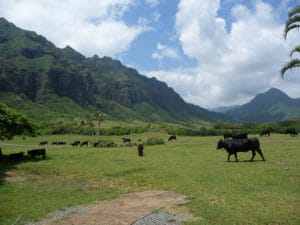Cornucopia’s Take: Center for Food Safety hosted a conference for ranchers in Hawaii, “Healthy Soils, Healthy Ranching.” Ranchers and experts gathered to network and learn from one another, and to begin carbon monitoring. Cornucopia supports this and other initiatives on sustainable farming that recognize the importance of soil and its intimate connection to farming.
Healthy Soils, Healthy Ranching in Hawai‘i
Soil Solution
 |
Earlier this month, Center for Food Safety brought together its Soil Solutions program and its Hawai‘i office to host “Healthy Soils, Healthy Ranching” – a conference for ranchers from across the state of Hawaii at Puʻu O Hoku Ranch on the island of Molokai.
This conference brought together forward-looking ranchers with a variety of experts to share best practices, review emergent science on the role of soil health in climate change mitigation, and create a rancher-to-rancher network for future data monitoring and collaboration. Participants were welcomed to the beautiful ranch by Ashley Lukens, director of Hawai’i CFS. Soil Solutions program director, Diana Donlon brought attendees up to speed on the climate angle by outlining the direct connection between soil degradation and excess atmospheric carbon.
Johann Zietsman, a pioneer in holistic planned grazing from Zimbabwe who now consults with land managers around the world, made the long journey to meet with the ranchers. Although Zietsman doesn’t ranch on a tropical island, the group found his advice on animal health relevant to any ecosystem. David Johnson, a molecular biologist specializing in soil microbiology at New Mexico State University, spoke about the importance of maintaining thriving soil microbial communities. Johnson has developed a system he calls “biologically enhanced agriculture management” or “BEAM.” Johnson’s experiments using BEAM show a new direct correlation between improving fungal–bacterial ratios in soils and increasing the ability to capture, store and retain atmospheric C02 as new soil carbon.

